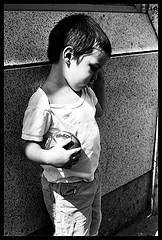Warning Labels
November 20, 2014 By: Melissa Sadin I recently took my son, TS, on a mission trip with the church youth group. The group was to spend four days helping to prepare a camp in the NJ Pine Barrens for opening day. It was a challenge for my son because he does not do well with […]
Bob Burroughs: School in an Attachment-Focused Residential Program
October 9, 2014 by: Lorraine Schneider This interview was part of ATNs Educating Traumatized Children Summit (Day 10). Bob Burroughs, PhD: School in an Attachment-Focused Residential Program First, do no harm. That’s what Bob Burroughs, head of the school at CALO says. We would all agree with him. Right? No one wants to harm our […]
Joel Ristuccia: Impact of Trauma on a Child’s Ability to Learn
September 30, 2014 by: Gari Lister I am delighted to be able to share some thoughts on the very substantive and insightful interview of Joel Ristuccia, Ed.M, from the Massachusetts Advocates for Children, Trauma and Learning Policy Initiative. His interview was presented as part of ATN’s Educating Traumatized Children Summit. Joel Ristuccia: Impact of Trauma on […]
Because It Is Hard
By: Gari Lister
“We choose to go to the moon . . . not because it is easy, but because it is hard . . . because that challenge is one that we are willing to accept, one we are unwilling to postpone, and one which we intend to win.. . . ” John F. Kennedy, Jr. (Sept. 12, 1962 at Rice University)
“Loss” – The “L” Word

By: Jane Samuel
Driving to school this morning my youngest (chronological age 11, emotional age – always open for debate) and I were discussing her father’s upcoming business trip to Asia. Pulling up to a stoplight, I glanced sideways and did a quick check of her demeanor. While she has gotten much better in the past few years about family members coming and going in her life, I still try to be on the lookout for signs that an upcoming loss – albeit a temporary one – might flip her internal emotional balance on its end. “Trigger her” as we say in the therapeutic parenting business.
I’m So Strong . . .
by: Julie Beem
“I’m so strong that I could destroy this whole house.” His declaration was matter-of-fact, not launched as a threat but to gauge my response. “Really?” I responded, “why would you want to destroy my house?” “Because I’m powerful enough.”
Letting Go
by: Jane Samuel
She calls me from the spa-sleep-over-birthday-party and I am not surprised. There is a catch in her voice and she is asking me to bring money. I don’t question. I just get in the car and drive to her.
Abandoned
By: Jane Samuel
I knew the minute my husband pulled out of the lot and darted across the street to drop me at the pharmacy that it was a bad idea. Our youngest had run back into the retirement home where my father lived to retrieve a forgotten item and my husband thought it would be quicker to pull across, drop me, and run back and get her while I shopped. Problem is he didn’t tell her. He just figured he could get back before she noticed. Wrong.
Resilience – Inborn or Learned – Part 2
By: Julie Beem
The listing of factors that make children resilient from Resilience Theory: A Literature Review by Adrian DePlessis VanBreda made total sense to me. But the paragraph of conclusion supposedly based on these factors did not:
Resilience – Inborn or Learned – Part 1
By: Julie Beem
There’s a lot of talk about resilience being the antidote to trauma. Lots of workshops, books, and training programs talk about building resilience in kids as a way to counteract the impact of trauma in their lives. On the surface all this seems to make sense, but it’s always puzzled me. What did people mean by resilience, and why does it appear that my child has none, even after years of parenting her?